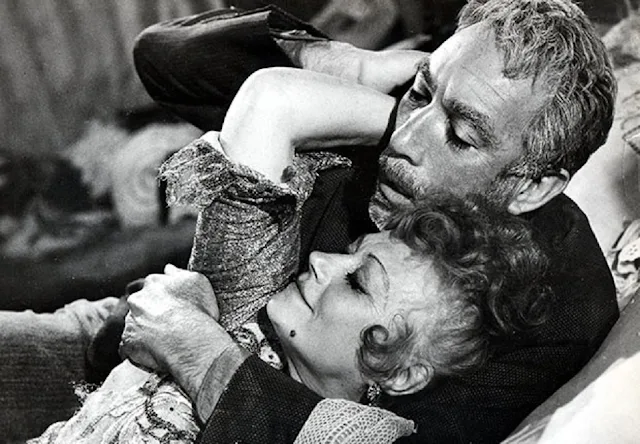 |
| Macha Méril and Sandrine Bonnaire in Vagabond |
Mme. Landier: Macha Méril
Yolande: Yolande Moreau
Jean-Pierre: Stéphane Freiss
Assoun: Yahiaoui Assouna
David: Patrick Lepcynski
The goatherd: Sylvain
The goatherd's wife: Sabine
Aunt Lydie: Marthe Jarnias
Director: Agnès Varda
Screenplay: Agnès Varda
Cinematography: Patrick Blossier
Film editing: Patricia Mazuy, Agnès Varda
Music: Joanna Bruzdowicz
We Americans tend to regard homelessness as a socio-economic problem, a consequence of a lack of economic opportunity (i.e., jobs) and affordable housing. But leave it to the French, or more specifically to Agnès Varda, to see it as an existential problem, a challenge to our notions of freedom. Mona Bergeron, found frozen to death at the start of Vagabond, couldn't have cared less about economic opportunity if she could find just enough to buy some bread that wasn't too stale and hard to eat, and she carried her housing, a tent, with her. Nor does she care that the stench from her unwashed clothes and body is repellent to some that she encounters as she hitchhikes her way around the Languedoc. Hers is a life, as the French title, Sans Toit ni Loi, says, "without roof or rules." She's not your typical off-the-grid dropout: Those are embodied in the film by the goatherd with a degree in philosophy who scorns Mona for her unwillingness to work, to which she responds that she may stink but she's free; he works all the time and stinks anyway. Varda has crafted an extraordinary docudrama, featuring both professional actors and people who actually met the real Mona Bergeron, played beautifully by Sandrine Bonnaire. Varda has a way of summing up things in simple images, such as the one above with the manicured hands of Mme. Landier, the scientist who picks up the hitchhiking young woman, and the grimy fingers of Mona, meeting but not touching across a cafe table. In simple strokes, Varda examines not only Mona's life but also those of people who encounter her: Mme. Landier, her colleague Jean-Pierre, the goatherd and his wife, and Yolande, a young woman who nominally takes care of the elderly Aunt Lydie, with whom Mona easily strikes up a more effective rapport. It's a bleak, sometimes funny, sometimes profound film that never succumbs to sentimentality or falseness.



























